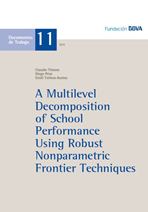The Ivie has coordinated working paper number 11 of 2012, published by the BBVA Foundation, "A multilevel decomposition of school performance using robust nonparametric frontier techniques". This study, along with other papers, is available on the BBVA Foundation website.
Working paper no. 11/2012: A multilevel decomposition of school performance using robust nonparametric frontier techniques
 This working paper proposes a methodology for evaluating educational performance, from a multilevel perspective. We use partial frontier approaches to mitigate the influence of outliers and the curse of dimensionality. We consider idiosyncratic variables at the school, class, and student levels. Our model is applied to a sample of students in fourth year of primary school in Chile. Results are consistent with previous ones that found that less than 30% of the variance in students’ educational attainment was attributable to schools. Our application also corroborates that a model considering only student-level variables would yield high inefficiencies not attributable to the school management, but rather to inadequate resource-endowments. In other words, when disregarding specific variables concerning the resources allocated to schools, the performance of those schools is undervalued, largely because inefficiencies caused by suboptimal resource endowments or difficulties that arise from the socioeconomic environment are instead attributed to poor management.
This working paper proposes a methodology for evaluating educational performance, from a multilevel perspective. We use partial frontier approaches to mitigate the influence of outliers and the curse of dimensionality. We consider idiosyncratic variables at the school, class, and student levels. Our model is applied to a sample of students in fourth year of primary school in Chile. Results are consistent with previous ones that found that less than 30% of the variance in students’ educational attainment was attributable to schools. Our application also corroborates that a model considering only student-level variables would yield high inefficiencies not attributable to the school management, but rather to inadequate resource-endowments. In other words, when disregarding specific variables concerning the resources allocated to schools, the performance of those schools is undervalued, largely because inefficiencies caused by suboptimal resource endowments or difficulties that arise from the socioeconomic environment are instead attributed to poor management.
Claudio Thieme is a professor at the Universidad Diego Portales. Diego Prior Jiménez is currently professor at the Universitat Autònoma de Barcelona. Emili Tortosa-Ausina is a researcher at the Ivie and a professor at the Universitat Jaume I.
Working paper no. 11/2012: A multilevel decomposition of school performance using robust nonparametric frontier techniques
 This working paper proposes a methodology for evaluating educational performance, from a multilevel perspective. We use partial frontier approaches to mitigate the influence of outliers and the curse of dimensionality. We consider idiosyncratic variables at the school, class, and student levels. Our model is applied to a sample of students in fourth year of primary school in Chile. Results are consistent with previous ones that found that less than 30% of the variance in students’ educational attainment was attributable to schools. Our application also corroborates that a model considering only student-level variables would yield high inefficiencies not attributable to the school management, but rather to inadequate resource-endowments. In other words, when disregarding specific variables concerning the resources allocated to schools, the performance of those schools is undervalued, largely because inefficiencies caused by suboptimal resource endowments or difficulties that arise from the socioeconomic environment are instead attributed to poor management.
This working paper proposes a methodology for evaluating educational performance, from a multilevel perspective. We use partial frontier approaches to mitigate the influence of outliers and the curse of dimensionality. We consider idiosyncratic variables at the school, class, and student levels. Our model is applied to a sample of students in fourth year of primary school in Chile. Results are consistent with previous ones that found that less than 30% of the variance in students’ educational attainment was attributable to schools. Our application also corroborates that a model considering only student-level variables would yield high inefficiencies not attributable to the school management, but rather to inadequate resource-endowments. In other words, when disregarding specific variables concerning the resources allocated to schools, the performance of those schools is undervalued, largely because inefficiencies caused by suboptimal resource endowments or difficulties that arise from the socioeconomic environment are instead attributed to poor management.Claudio Thieme is a professor at the Universidad Diego Portales. Diego Prior Jiménez is currently professor at the Universitat Autònoma de Barcelona. Emili Tortosa-Ausina is a researcher at the Ivie and a professor at the Universitat Jaume I.






